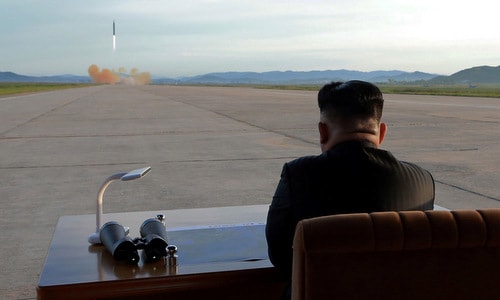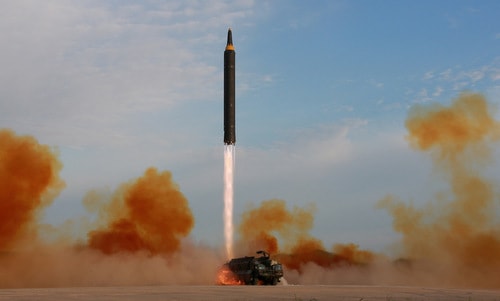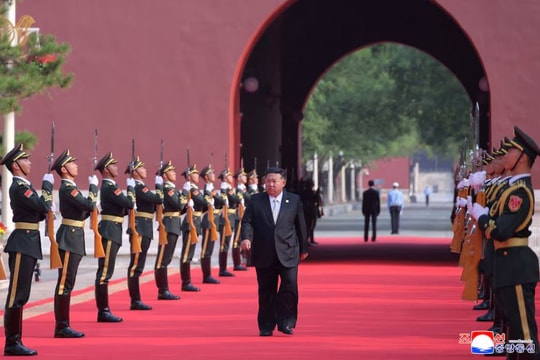Detonating a thermonuclear bomb in the Pacific Ocean - North Korea's terrifying move
Detonating a hydrogen bomb over the Pacific would demonstrate the success of North Korea's nuclear program, but it is a risky move.
 |
North Korea may use the Hwasong-12 missile to carry a thermonuclear warhead. Photo: Reuters |
North Korean Foreign MinisterRi Yong-ho said on September 21 that North Korean leader Kim Jong-un is considering testing an "unprecedentedly large hydrogen bomb" over the Pacific Ocean, in response to US President Donald Trump's threatening speech before the United Nations General Assembly.
Detonating a nuclear-tipped missile over the Pacific would be a logical next step for North Korea, demonstrating its success in developing weapons. However, arms control experts say it would be extremely dangerous and highly provocative, Reuters reported.
"This could mean Pyongyang will launch a Hwasong-12 intermediate-range ballistic missile (IRBM) or Hwasong-14 intercontinental ballistic missile (ICBM) carrying a nuclear warhead, then detonate it at an altitude of several hundred kilometers above the Pacific Ocean," said Yang Uk, a researcher at the Korea Defense and Security Forum.
Mr. Yang Uk said that North Korea may be playing catch-up, but they still need to test their ability to mount nuclear warheads on missiles. "North Korea may have planned ahead and used President Trump's remarks as an excuse to launch a missile," Mr. Yang said.
If Pyongyang's claim is confirmed, it would be the first atmospheric nuclear test in nearly 40 years. The International Atomic Energy Agency (IAEA) said the last atmospheric test was in 1980, when China tested a thermonuclear warhead.
Tests of nuclear-armed ballistic missiles are even rarer. The United States has conducted only one, a submarine-launched missile in the Pacific Ocean in October 1962. China was widely condemned for conducting a similar test at Lop Nur in 1966. All six of North Korea’s nuclear tests have been underground.
"We have to assume they have the capability to do so, but it would be too provocative. Putting a nuclear warhead on a missile that has only been tested a few times, flying it over populated areas... If things don't go as planned, it would be a world-changing event," said Professor Vipin Narang at the Massachusetts Institute of Technology in the US.
 |
The successful ICBM and IRBM tests show Pyongyang's unexpected progress. Photo: Reuters |
North Korea fired two ballistic missiles over Hokkaido, northern Japan, last month, a series of tests that showed surprisingly rapid progress in Pyongyang's weapons program.
"When they say Pacific, it means the missile will fly over Japan. North Korea wants to end any doubts about their ability to build IRBMs and ICBMs," researcher Melissa Hanham said.
Ballistic missiles would be North Korea’s preferred delivery method for nuclear warheads. It could also place a hydrogen bomb on a ship and detonate it. Either option would have serious environmental and diplomatic consequences. Japan’s Chief Cabinet Secretary Yoshihide Suga has called North Korea’s missile launch over Japanese territory “completely unacceptable.”
Professor Narang said that detonating a nuclear bomb at high altitude would limit the spread of radioactive dust, but would pose a risk of destroying all electrical equipment due to an electromagnetic pulse (EMP). North Korea has threatened to use EMP weapons to attack the US and its allies.
"If the test goes as planned and the warhead detonates at a low altitude, we will see some EMP effects and severe damage to the natural environment," Mr. Narang said.
Why North Korea keeps testing ballistic missiles
North Korea has test-fired 22 ballistic missiles this year, as it works to perfect its ability to develop nuclear weapons capable of hitting the US mainland. If Kim Jong-un’s threat comes to fruition, it would mark a shift in China’s policy and prompt more countries to demand an end to North Korea’s leadership.
Some experts say Pyongyang will not rush to conduct an atmospheric nuclear test for technical reasons and diplomatic risks. "I would be surprised if this is Pyongyang's next step. They have yet to test an ICBM at full range over the Pacific, which would be something they would need to do first," concludes writer Joshua Pollack.
According to VNE
| RELATED NEWS |
|---|






.jpg)

